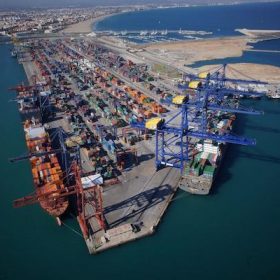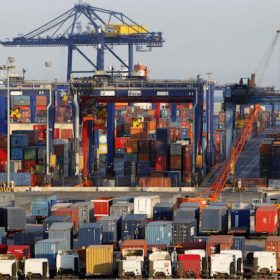El consejo de administración del Puerto de Barcelona ha aprobado el Tercer Plan Estratégico del Puerto de Barcelona (2015-2020) con las líneas estratégicas de la infraestructura y su comunidad portuaria para afrontar los retos del próximo quinquenio.
Según ha informado el Puerto, el plan, que se presentará próximamente, identifica como factores claves de éxito, el aprovechar el buen posicionamiento del Puerto de Barcelona ante los principales flujos del comercio mundial y ser excelentes en la prestación de servicios.
También destaca el establecer alianzas con otros puertos, administraciones y operadores y seguir trabajando en la ampliación y consolidación del «hinterland» o área de influencia a través del desarrollo del puerto en red.
El documento incluye tres novedades respecto a los anteriores planes estratégicos, como que abarca todos los ámbitos de negocio del puerto, fija las metas cuantificables, tanto en tráficos como en la prestación de servicios e incluye un apartado sobre la Autoridad Portuaria.
El nuevo plan mantiene inalterable la misión del Puerto: «contribuir a la competitividad de los clientes del puerto mediante la prestación de servicios eficientes que respondan a sus necesidades de transporte marítimo, transporte terrestre y servicios logísticos».
También define objetivos estratégicos alrededor de tres ejes básicos: el crecimiento del tráfico, la competitividad y la sostenibilidad medioambiental, social y económica.
Por otra parte, el consejo de administración de hoy ha aprobado la nueva Delimitación de Espacios y Usos Portuarios (DEUP) imprescindible para la ejecución de los accesos ferroviarios, que prevé la incorporación a la zona de dominio portuario de espacios que serán objeto de estas obras.
Por otro lado, también ha acordado abrir el concurso para la explotación técnica y comercial de su plataforma de comercio electrónico, que se licitará por un plazo de tres años, prorrogables por dos más y un importe máximo de 526.000 euros cada año.
Por último, el acuerdo también incluye la concesión al Ayuntamiento de Roses (Girona) sobre el Far de Roses por un periodo de 15 años, que prevé que los espacios técnicos del faro continúen bajo responsabilidad de la Autoridad Portuaria y que el ayuntamiento pueda dedicar el resto de espacios a usos culturales.
[:en]The administration council of the Barcelona Port has approved the Third Strategic Plan of the Barcelona’s harbor (2015-2020) with the strategic lines of the infrastructure and its portuary community to face the challenges of the next 5 years.According to the Port, the plan, which will be announced shortly, identifies as key elements for success, to take advantage of the positioning of the Barcelona Port in the principal flows of the world commerce and to excel in the provision of services.
It also highlights to establishing partnerships with other ports, administrations and operatives and to keep working towards the extension and consolidation of the “hinterland” or area of influence through the development of the port in net.
The document includes three news from the previous strategic plans, such as including all the fields of business of the port, fixing the quantifiable goals, both in traffics and in the provision of services, and includes a section about the Portuary Authority.
The new plan keeps unalterable the mission of the Port: “to contribute towards the competitiveness of the clients of the port through the efficient provision of services that respond to the needs of maritime transport, terrestrial transport and logistic services.
It also defines strategic objectives around three basic axis: the growth of traffic, the competitiveness and the environmental, social and economic sustainability.
In the other hand, today’s administration council has approved the new Delimitation of Portuary Uses and Spaces (DEUP) indispensable for the execution of the ferroviary access, that anticipates the incorporation to the zone of portuary control which will be object of this constructions.
In the other hand, it has been agreed to open a contest for the technical and commercial exploitation and its platform of electronic commerce, which will be allowed for a period of three years, extendable for two more years and with a maximum amount of 526.000 euros per each year.
At last, the agreement also includes the concession to the Town Hall of Rosas (Girona) about el Far de Roses, for a period of 15 years, that anticipates that the technical spaces of the far will continue under responsibility of the Portuary Authority and that the town hall can dedicate the rest of the spaces for cultural use.[:]
 Español
Español


